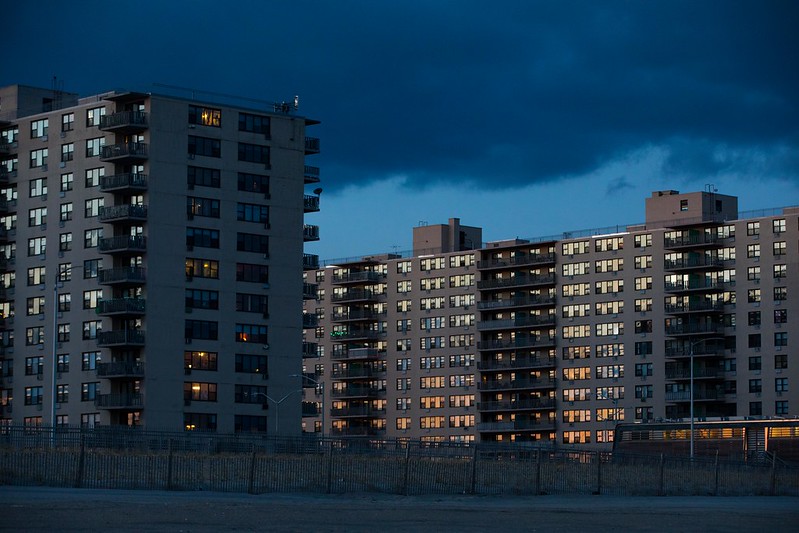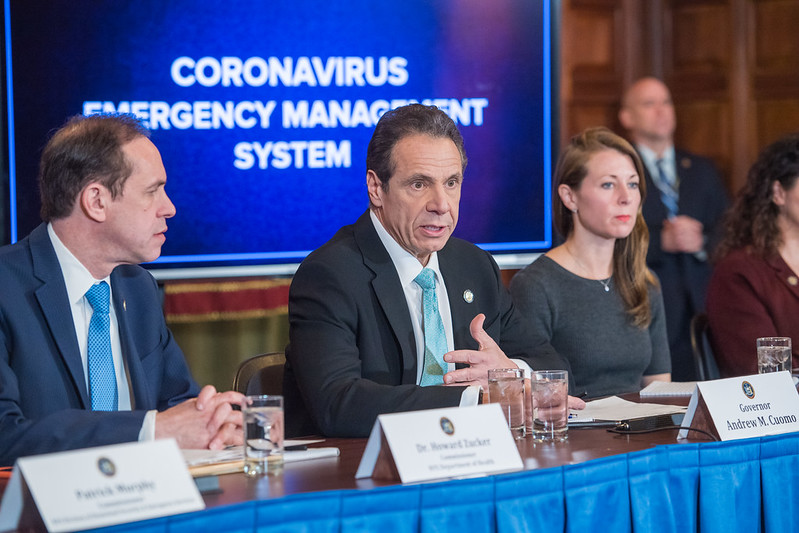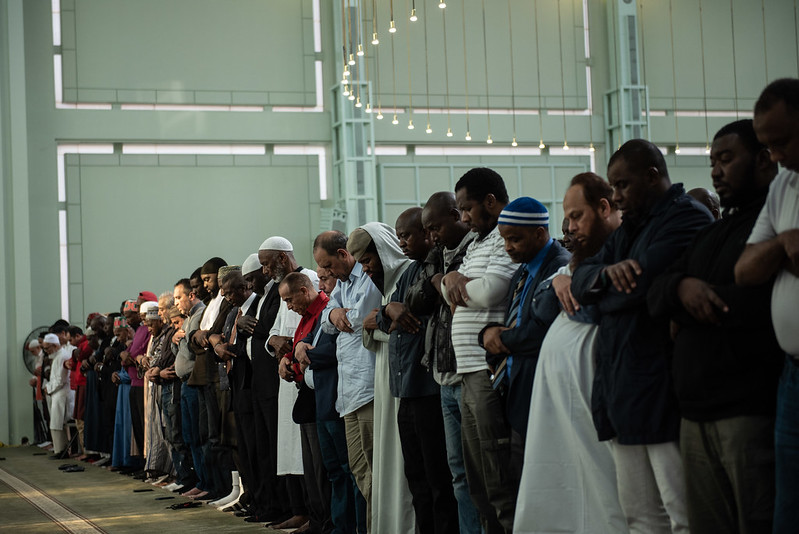New York Must Halt Evictions Amid Coronavirus Pandemic

People need secure housing for themselves & others (photo: Benjamin Kanter/Mayoral Photo Office)
No one is immune to the novel coronavirus: The World Health Organization recently declared the outbreak a pandemic, Governor Andrew Cuomo declared a state of emergency, and the congressional doctor reportedly expects up to 150 million citizens to be infected.
Do you know who is most vulnerable to COVID-19? Health professionals have identified people who are elderly and sick as particularly at risk, but we must not forget those who are poor or homeless. New York City has the largest homeless population in the country, and our homeless shelters are ill-equipped to deal with a highly contagious disease. Now is the time for New York to act by protecting the most vulnerable New Yorkers.
Our government can mitigate this growing public health crisis in several ways. One is that New York State should institute an eviction moratorium immediately. Eviction moratorium plans are already underway in San Jose and San Francisco -- and many more cities are expected to follow.
An eviction moratorium in New York is the bold and sensible action we need. Taking this important step not only gives reprieve to thousands of tenants from becoming homeless, which is necessary in itself, it would also slow the growth of this pandemic. As studies have shown again and again, good housing policy is truly also good healthcare policy.
As a housing attorney, I see thousands of people pass through New York City housing court daily. These tenants are disproportionately poor, black and Latino, immigrants, LGBT people, seniors, people with disabilities, and women. In fact, New York City’s Open Data Portal shows over 3,000 executed evictions have taken place since January 2020. Each eviction places already vulnerable seniors and people with health issues -- their families and everyone they come in contact with in the court system -- at further risk.
Mayor Bill de Blasio has urged New Yorkers to limit nonessential commuting, but how do we expect thousands of tenants to heed this call when they must commute to work to try to make rent? Or commute to court or risk losing their home there? How do we expect poor people, who may be exhibiting symptoms of infection, to self-quarantine, when there is nowhere to quarantine if they lose their home? We need an eviction moratorium now.
Legal services organizations, and the unions representing thousands of attorneys, paralegals, and advocates, have reached out to Governor Cuomo and Chief Judge DiFiore of the Office of Court Administration to implement measures to: stay warrants of eviction, adjourn cases rather than issuing defaults, and provide litigants with the opportunity to appear by videoconferencing. The Right to Counsel NYC Coalition has called on the governor to close housing court, except for applications for emergency relief. These requests are still pending.
As the pandemic grows, so does the growing chorus of advocacy groups demanding an eviction moratorium. A recent online petition, organized by the Upstate Downstate Housing Alliance and Housing Justice for All, garnered over 2,000 signatures in one day alone. And, there is mounting momentum among elected officials, including Manhattan Borough President Gale Brewer, who issued a public letter calling on Chief Judge DiFiore to declare a moratorium on evictions immediately. State Senators Brad Hoylman and Brian Kavanagh are introducing legislation to enact a statewide moratorium on evictions and foreclosures during the coronavirus pandemic and future emergency declarations.
While we wait on Governor Cuomo, the State Legislature, and Chief Judge DiFiore to act on the state level, Mayor de Blasio can act on the city level. The mayor can and should institute a moratorium on all NYCHA eviction-related cases in public housing. During Hurricane Sandy, NYCHA instituted an eviction moratorium in response to the urging and advocacy of The Legal Aid Society. In addition to the eviction moratorium we saw during Hurricane Sandy, the precedent exists in the winter months for broadly similar reasons raised now regarding public health concerns of homelessness and the real risks to life.
The coronavirus pandemic is highlighting some of the greatest inequalities in our society. On the national level, we are hearing the demand for large-scale programs such as national paid sick leave and Medicare for All. Given the state of our federal government, these are worthy long-term goals that, at the moment, are theoretical responses to the current crisis. In the meantime, there is at least one simple and immediate proposal on the table right now in New York: an eviction moratorium, and we can get it done immediately.
***
Jason Wu is a housing attorney for The Legal Aid Society of New York and a Trustee for the Association of Legal Aid Attorneys, UAW 2325. On Twitter @CriticalRace.
***
Have an op-ed idea or submission for Gotham Gazette? Email This email address is being protected from spambots. You need JavaScript enabled to view it.
Surveillance and the City: Cuomo’s Coronavirus Coup

The Governor has acquired new powers (photo: Darren McGee/Governor's Office)
It may be Chicago’s Rahm Emanuel who’s famous for saying that you should “never let a good crisis go to waste,” but it’s New York’s Andrew Cuomo who’s taking the adage to heart. For proof, one need only look to the governor’s response to the recent coronavirus outbreak.
There should be few things less divisive than how we respond to a public health crisis. Increase funding for hospitals? Of course. Reduce barriers to disease testing? Without a doubt. So, when the governor called for $40 million in emergency funding to fight COVID-19, it would have seemed like a slam dunk. Then why did the chairs of the State Assembly and State Senate health committees vote against the response?
The reason they said “no” wasn’t the price tag of the bill, but the power grab buried inside. In a matter of hours, Cuomo pushed through language that not only gave him more money, but the broadest emergency powers of any governor in the country, according to an analysis by my organization, The Surveillance Technology Oversight Project.
Even before the new law, Cuomo had sweeping authority. The governor could suspend any law or regulation that got in the way of emergency response, which was enough to make civil rights advocates nervous. But not even George Orwell could have imagined what would come next.
The governor “may issue any directive during a state disaster emergency…necessary to cope with the disaster and may provide for procedures reasonably necessary to enforce such directive.” Strip away the legalese and we’re left with the power to do anything in time of crisis.
It’s staggering — the thought of one person having the power to rewrite state laws without so much as a second opinion from lawmakers. And this isn’t just for COVID-19, the emergency powers covers everything from tornadoes and volcanoes (do we have those in New York?), to drought, and vaguely defined “cyber events.” And, unsurprisingly, it’s the governor who gets to declare an emergency in the first place.
We’ve been down this road before. Few of us forget the panic-struck days after 9/11, when a public desperate to feel safe again supported legislation like the USA PATRIOT Act and the Authorization for Use of Military Force. In a matter of days, we rewrote the way our country has been governed for decades.
The PATRIOT Act, which was supposed to sunset just a few years later, became a fixture of American life, giving birth to the perpetual surveillance later exposed by the likes of Edward Snowden. The AUMF has been used to justify military strikes as recently as last year, when President Trump assassinated the Iranian military leader Qasem Soleimani. Prior to the AUMF, that sort of military action without Congressional approval would have been blatantly unconstitutional, but the Trump administration claimed that 18 years later, the AUMF is still giving the President a green light to kill nearly anyone he wants, at any time, and in nearly any place.
How long will Cuomo’s new emergency powers be with us? It’s hard to know. The new law is set to expire in just over a year, but the history of the PATRIOT Act teaches us that emergency laws may live on far longer than we first expect. Cuomo himself has indicated he thinks it makes sense as a permanent adjustment.
Even more alarming was the process. The legislation meant one of the most fundamental transformations of New York State government in generations, and it happened with almost no notice or debate. Even worse, the emergency powers were tied to the same legislation as COVID-19 funding, so those who voted against the bill now face the prospect of attacks claiming they opposed providing emergency pandemic cash.
Sometimes emergencies call for immediate action, but nothing the governor did here required the legislature to abdicate its role. The few reforms we’ve seen since last week could have been easily approved by lawmakers, and the emergency powers legislation could have been given at least time for a debate.
In a week when the state Legislature held hearings on everything from loan forgiveness for farmers to actuarial tables for health insurance, one would think that lawmakers would have time to discuss one of the most transformative New York bills in our lifetimes. Sadly, while it’s very easy to take new powers in an emergency, it’s generally a lot harder to roll them back.
***
Albert Fox Cahn is the founder and executive director of The Surveillance Technology Oversight Project (S.T.O.P.) at the Urban Justice Center, a New York-based civil rights and privacy group and a fellow at the Engelberg Center for Innovation Law & Policy at N.Y.U. School of Law. He writes the monthly Surveillance and the City column at Gotham Gazette. On Twitter @FoxCahn & @STOPSpyingNY.
***
Have an op-ed idea or submission for Gotham Gazette? Email This email address is being protected from spambots. You need JavaScript enabled to view it.
Don’t Let Them Win - Muslim New Yorkers Must Participate in the 2020 Census

Muslim New Yorkers in prayer (photo: Michael Appleton/Mayoral Photography Office)
As we again learned in 2016 and 2018 that voting matters and elections have consequences, we must also recognize -- ahead of time, right now -- that the 2020 Census matters and not being counted has consequences.
After 2016, many New Yorkers have been mobilizing to bring progressive voices to elections: from supporting change in Albany and flipping local House seats to turning entire state legislatures blue across the nation and backing chosen presidential candidates. We have been organizing and fundraising for campaigns, with intense focus and passion — cheering every win, large and small, across the country.
We are maligned as “snowflakes” for caring about people and inclusive values, but it is our passion that carried our wins in recent elections and what is required for the big win this fall.
However, there is one critical campaign that isn’t getting the same attention: the 2020 Census.
New York City is at risk of a huge undercount in the 2020 Census, which would result in undermining our democracy and communities by leading to decreased political representation and decreased federal funding for the next ten years.
Anti-immigrant and Islamophobic federal messaging and policies combined with concerns about data privacy have created legitimate anxiety in many communities around anything involving the U.S. government. This is especially true of the Census, which to some feels like a registry akin to the special registry of some Muslim immigrant men after 9/11 or the list of undocumented immigrants the Trump administration was clearly hoping to develop with its failed citizenship question.
Additionally, the 2020 Census will initially call for online submissions for the first time. While that will simplify the process for some digitally-savvy individuals, it will not be as easy for all Americans. Filling out a form online is more complicated than sharing a funny cat meme and many communities lack sufficient access to the internet as well as limited digital literacy. Combine this with fears of the government, especially but not limited to the Trump administration, and you have a perfect storm that can lead to nonparticipation.
Historically, New York City has faced census participation challenges. In the 2010 Census, the city had a 61.9% average initial household self-response rate, well under the national rate of 75.8%, with some communities as low as 44%, like those in Brooklyn’s Brighton Beach or the 50% rate in Bronx’s Eastchester Heights.
Census data is crucial to providing social services, Medicaid, education, and funding for infrastructure, such as our subways and bridges. It is key to states’ ability to advocate for their fair share of $670 billion in annual federal funding, in part because the Census also determines political representation, most directly in terms of seats in the House of Representatives. New York is at risk of losing up to two Congressional seats this time around.
Undercounted communities will have less representation at the federal level but also state and city levels once the Census leads to legislative redistricting.
The anxieties of traditionally marginalized communities around government data collection are not at all misplaced. For example, Muslims are intimately familiar with the risks: the NYPD utilized publicly-available aggregate census data to spy on Muslim communities after the September 11, 2001 terror attacks.
But that very same data also helps advocates and government better support the very same communities. For example, racial demographic data is utilized by civil rights lawyers to highlight racial inequity in policing and incarceration as well as political representation. Muslim communities have advocated successfully and used data to push for Muslim school holidays and halal lunches at senior centers and schools.
An Imam asked me, “Why would anyone fill this out? In this current time with this current government?”
But the answer is that we must fill out the Census form, especially at this time, especially with this government. If we don’t, they will win so much more than just an election. If we do not participate in the Census, then we will lose the ability to fully participate in our democracy, binding our communities for decades.
If you believe that the future of our democracy is at stake in the upcoming election, that the safety and security of our most vulnerable communities is on the line, then you should be just as passionate about ensuring that you and every individual in your community near and far gets counted in the 2020 Census.
Get involved in your local 2020 Census organizing committee; in New York City join your Neighborhood Organizing Census Committee. Help get the word out to all your friends and family and volunteer in April and beyond to help ensure everyone completes the 2020 Census.
***
Ahsia Badi is the New York Census Director for Emgage, the largest non-profit focused on Muslim civic engagement, and is a member of Manhattan Community Board Six. On Twitter @kashmirimama & @EmgageAction.
***
Have an op-ed idea or submission for Gotham Gazette? Email This email address is being protected from spambots. You need JavaScript enabled to view it.




